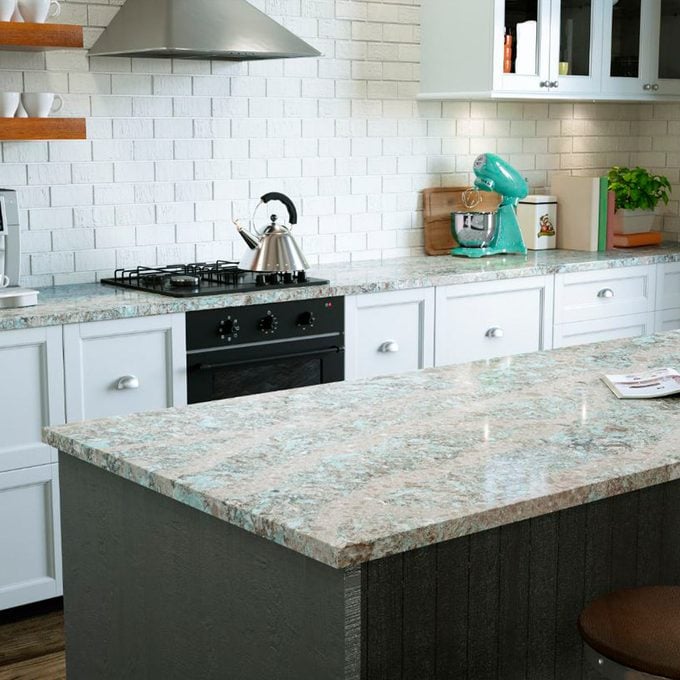The Pros and Cons of Quartz Countertops
Updated: Jan. 24, 2022
Quartz countertops are sometimes called quartzite or engineered stone. They are made by combining ground quartz with synthetic resins and colorants under heat and high pressure. Here are the pros and cons of quartz countertops.

About Quartz Countertops
Quartz countertops, like the one shown here, are sometimes called quartzite or engineered stone. They are made by combining ground quartz with synthetic resins and colorants under heat and high pressure. Here are the pros and cons of quartz countertops.
Pro = Variety
Because manufacturers control the process, these countertops come in a wider variety of colors and designs than natural stone. Many people find it difficult to distinguish high-quality quartz countertops from granite, marble and other natural stone. For a contemporary look, some quartz countertops include recycled glass and metallic flecks.
It’s also easier than you might think to keep your quartz countertops shipshape. Learn how to clean quartz countertops the best way.
Just starting to look at countertops and trying to decide what’s best for you? We walk you through the pros and cons of each and compare costs as well.
Pro = Low maintenance
As factory-made composites, the quartz countertops are homogeneous and nonporous. That rids them of the types of defects that can weaken natural stone slabs and it eliminates the need to seal the surface. Quartz countertops are more sanitary, making them an ideal choice for kitchens and bathrooms. Plus, the countertops are nearly twice as scratch-resistant as granite.
Check out these 13 great-looking countertops that aren’t granite.
Pro = Design ease
Designing with quartz countertops is easier than with natural stone because the sample tiles are true representations. The material you see online or in the store looks exactly like what you’ll see in your home. That’s not usually the case with natural stone, since no two slabs of stone are identical.
If you’re considering installing a laminate countertop, here are the DIY instructions.
Pro = Cost
The installed cost of natural stone and quartz countertops is about the same. Depending on the quality of the material and the complexity of the job, expect to pay $100 to $200 per square foot. (For comparison, the average cost for a plastic laminate countertop is around $50 per square foot.)
Did you know that you can renew plastic laminate countertops? Here’s how to do it!
Con = Weather and heat resistance
While quartz countertops resist stains better than natural stone, they should not be used outdoors, because long-term exposure to sunlight will cause damage. In addition, quartz countertops are more susceptible to heat, so you need to be careful when setting down hot pans in the kitchen or hot hair styling appliances in the bathroom.
Con = Size limitations
Standard slabs of quartzite are 65.5 inches wide and 132 inches long, so oversize countertops will require a seam. Granite and other natural stone have no such size limits.
Use these pros and cons as a starting point, and make your countertop decision based on what works best for your lifestyle and budget.
Get the look of granite countertops in your kitchen without the expense, weight and difficulty of solid slabs with DIY-friendly polished granite tiles.
